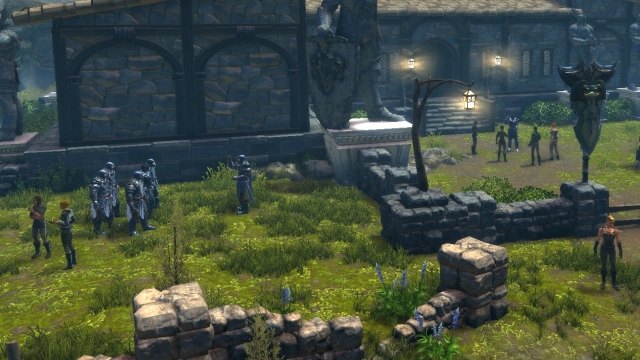In the earliest days of playing games online, the very idea of stretching a guild across more than one game was kind of ridiculous. Then again, this was also at a time when there were only two online games in existence anyway, so the odds of playing both of them were fairly low. The ubiquity of the internet has meant that online gaming is now pretty common, something that most people do rather than a small handful. And you might find yourself wondering why your League of Legends team can’t also be your guildmates in Final Fantasy XIV and your fellow criminals in GTA Online.
More simply, there are lots of online games out there, and it makes sense for a guild to not limit itself to just one game. If you have a sufficiently devoted playerbase, you can easily make your guild into something of a franchise, spanning many games with many different goals, all humming along as a port of call in multiple different games.
How do you make that work? With complexity, naturally! So let’s start untangling what you can do, starting with the very notion.

Branching out to multiple games
Let’s start with a basic assertion – if you have a guild in World of Warcraft with a small group who also play Heroes of the Storm, there’s no real need to extend your guild outward. One of the points of a guild is to have a social hub for people, and if people happen to share interests that take them outside of the forming game, so much the better. No, for it to be a full-on guild effort, you need more.
The main point of extending a guild across multiple games is to give players a reliable port of call in them. Today you’re playing one game, tomorrow you’re playing another, but you’re in the same guild in both games and you’re working with many of the same people. Thus, you’ll want to focus your attention on games where people are going to be active and playing for a while, something that’s not just a passing diversion.
There’s also the fact that you want to assess crossover potential. How many people in your World of Warcraft guild will want to tool around in Heroes of the Storm? What about the other way around? In that particular case, it’s quite possible that you could wind up welcoming new members by having a presence in both games. If you’re talking about more divided games – say The Division and Star Wars: The Old Republic, for example – there might not be enough crossover to make it worthwhile.
So consider it ahead of time. It’s worth moving forward if you have reliable people who want to make a home in multiple games, less so if it’s a handful of people just dabble in another game. If you notice the crossover happening, think about branching out.
Common leaders
If you have a guild in both Guild Wars 2 and The Secret World, you want to make sure that both guilds are adhering to the same basic philosophy. As such, it’s useful to establish ahead of time that you have multiple people steering the ship, and that means that you need to no longer be in charge of the guild.
Once you’ve branched off into multiple games, you can’t have just one person at the head of a group. The group is now something of a franchise, and that means it also needs to plan for the possibility (or reality) that a leader is going to be more or less active in a given game. As such, you need to have a leader per game, coordinating and overseeing everything for that particular game, with the whole guild being appraised of any and all developments as they happen.
The person who first formed the guild can (and probably should) be given a nod as the founder, but they can’t (and probably shouldn’t) have any extra authority. Instead, it becomes a council of equals. If a member is causing a problem in one game, their actions have an effect on other games. If a corner case gets decided one way by one leader, that needs to be kept in mind by other leaders. Everything links together like that.
It’s also important to note that leaders from one game are officers in the other games; the leadership of the guild is part of why people wanted to extend it, after all.

Maintaining connection
So now your guild has branches in two different games. (Or more.) You have your leadership group established. How do you make sure that this is a guild stretching across multiple games and not just a pair of sister guilds?
Part of it will come down to the guild site. Yes, once you’re splitting your time across multiple guilds, you really do need to have a site; the tricks I’ve discussed previously just don’t work with a multi-game guild. You need a site. That will allow players who don’t necessarily see one another often or at all in-game to communicate and discuss issues in shared spaces, even if their primary focuses will be their games of choice.
In addition, you should make it clear to members that membership in the guild in Game A extends to membership in Game B. It’s not obligatory, but it is a given. You don’t have to fill out an application to become a member in another game. In this way, members are encouraged to check out the other game and see what it’s about, possibly even sticking around in the new game.
Encouraging crossover is a good thing, although you don’t want to go too far with it. It’s good to have a guild where the members feel that they’re welcome in any game hosting the guild; it’s bad to have one where it feels that multiple games are the expected default rather than an option.
What about nomads?
Obviously, what I’m talking about here are guilds that exist in multiple games at once. There are, however, guilds that extend across multiple games in a different fashion by virtue of the entire guild being nomadic. The guild as a whole plays a game for a while, then the whole guild packs up and moves to another game, albeit with the potential loss of a few members along the way. What about those guilds?
It’d be flippant to just leave it at “what about them,” but that’s kind of where I wind up. It’s not that there’s anything inherently wrong with those guilds, but when your guild is defined in large part by communal movement, normal rules of community management don’t exactly apply any longer. Your guild is clearly working as its own organism without much outside input, if any. The issues of guild management are replaced by the issues of getting your group to agree on its next collective destination.
If you do wind up recruiting in a more nomadic guild, of course, it’s important to note that when someone applies in the first place. Many players – quite possibly the majority – are playing an online game out of enjoyment and with an eye toward long-term commitment. If you know for a fact that your guild might well pull up roots and move down the metaphorical road, applicants deserve to be informed of that ahead of time. It doesn’t mean that it’s a dealbreaker for everyone, but some people won’t want to come along.
Personally, I’d prefer to set down roots and have a place to call home, even if I sometimes roam. But the important thing is that you find what works best for you and yours, whether that means a guild in one game, a guild stretched across many games, or a guild that just moves from game to game over time.







Published: Apr 19, 2016 07:01 am